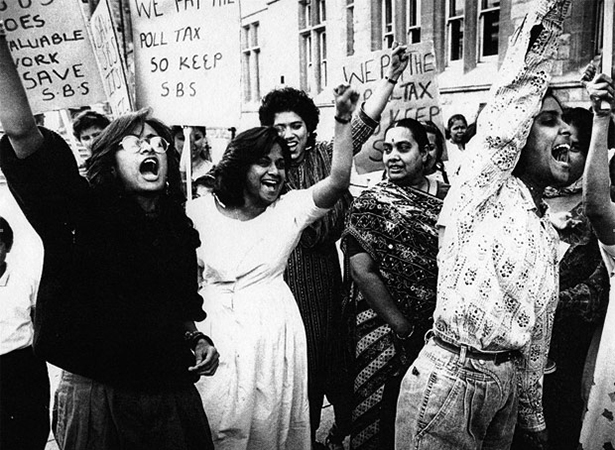Curator: Nick Aikens (curator Van Abbemuseum, Eindhoven)
On 11/6, 18/6 and 1/7 at 19:30
A screening program about subjective ways of writing history. Through the exploration of personal memories and alternative sources, filmmakers offer different ways of understanding the past. All of the screenings will be followed by a conversation with the artists.
Cultural practice has time and again set itself the task of forming, negotiating and re-assembling history in order to better understand the present. Today this task seems more prescient than ever when particular histories might help shed new light on a contemporary moment that feels uncertain and in flux. Beyond the use of the archive or documentary formats, however, what methodologies allow for a more emotive, fluid and tangible sense of history - and subsequently the present - to emerge? Speaking to History looks at a group of filmmakers working today who explore the conceptual and narrative potential of oral histories, the tangled relationship between spoken word and image and the use of cinematography to both make sense of and complicate our understanding of the past. Through the medium of film they thus examine the construction of narratives, whether they are personal, collective or historical.
The use of story telling and the subsequent play between word and image treats the past as an emotive force, understood through personal narratives or different subjectivities, contingent as they are on lived experience. Similarly, told from the present, these stories and images are framed by a sense of how they might be relevant for today. In this sense they echo what Walter Benjamin’s approach to engaging with history: “To articulate what is past does not mean to recognize ‘how it really was.’ It means to take control of a memory, as it flashes in a moment of danger.” The films look at a range of histories that appear to have implications for our understanding of the present – from an analysis of collective struggles of resistance, an examination of colonial histories, the passing of different ideological systems to more personal, subjective recollections. Told through the voices of those implicated in these histories, however, the protagonists become co-authors, both in the films themselves and the narratives they construct. As such, they reveal a porous relationship between individual subjectivity and collective history; memory and narrative.
Wednesday 1/7, 19:30:
- Petra Bauer, Sisters!, 2011
‘Sisters!’ is a collaboration between Swedish artist Petra Bauer and the Southall Black Sisters—the radical, pioneering London-based feminist organisation, who since 1979 have engaged politically in the contemporary social and political conditions of black and minority women. Documenting one week in the life of the organisation, the film takes their daily activities as the starting point for a visual discussion on feminism, politics and aesthetics in society today.
- Phil Collins, Marxism Today (prologue), 2010
‘Marxism Today (prologue)’ cautiously probes the contemporary lives of a group of people once instrumental in the cohesion of the German Democratic Republic. The three female protagonists share what they have learned since the dissolution of the society for which they were schoolteachers of Marxism-Leninism. The film is a poignant reminder of the extent to which the fault-lines and power struggles of history impact on individual lives.
Following the screenings Phil Collins will be in conversation with Annie Fletcher
Other screenings:
Thursday 11/06, 19:30: Manon de Boer – Wendelien van Oldenborgh
Language English
Location Kunsthal Extra City - Antwerpen-Berchem, Eikelstraat 25-31, 2600 Antwerpen

